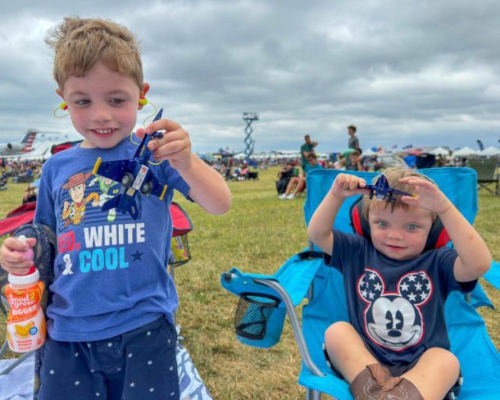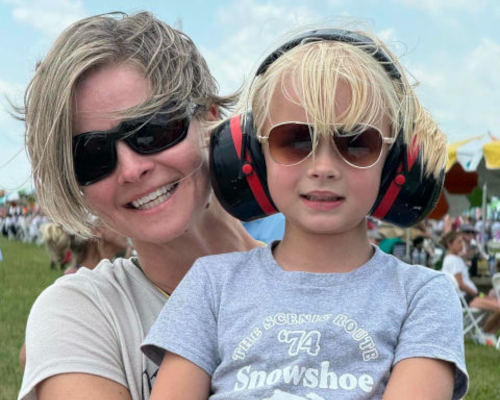Children’s Hospital Guide to Attending Show
June 13 - 14, 2026 | Dayton International Airport
The Cincinnati Children’s Hospital’s Guide to Attending the CenterPoint Energy Dayton Air Show Presented by Kroger
We are excited to partner with the Cincinnati Children’s Hospital to present this guide on preparing to attend the CenterPoint Energy Dayton Air Show Presented by Kroger.
This guide is focused on making sure you and your family have a safe and fun day at the Air Show. Check out each section below to learn more about preparing for your day at the show.


Tips for a Safe and Happy Visit to the Dayton Air Show
Summer is a great time for fun, sun and outdoor adventures for kids and their families. The CenterPoint Energy Dayton Air Show offers an exciting way to take in the sights and sounds of the season. Cincinnati Children’s is proud to return as a sponsor. Pediatrician Zenar Yohannes, MD, from Cincinnati Children’s Centerville Primary Cincinnati Children’s Centerville Primary Care, shares a few family reminders to keep your little ones safe this summer, especially while enjoying the Dayton Air Show.
Be Ready for Jet Noise
Loud noises surround us every day, from live music to fireworks, but the powerful roar of jet engines is louder than you think. Prolonged exposure to high-volume noises can have lasting effects on hearing and speech development, especially for children. A child’s ears are especially sensitive because their smaller ear canals intensify sounds. If it feels too loud for an adult, it’s definitely too loud for a child. Take precautions to protect your child from the intense jet engine sounds, as well as other loud environments.
Use hearing protection like over-ear hearing protection or earplugs at loud events.
Teach older kids and teens about safe volume levels on devices.
Avoid loud environments, when possible, especially for infants.
Protect Skin from the Sun
There’s so much to see and admire at the Dayton Air Show. While you’re captivated by the jets, it’s easy to lose track of how long you’ve been out in the sun. For infants under 6 months old, parents should avoid direct sunlight. Try to find shade under an umbrella or within a stroller. If possible, have the baby wear a sun hat with a brim that covers not only the face and ears but also the back of the neck. For children over six months old, apply a “broad-spectrum” sunscreen with a sun protection factor (SPF) of at least 30 to all exposed areas. Parents should apply sunscreen 15 to 20 minutes before going outdoors and reapply every two hours.
Take your time to find a sunscreen that works best for you and your child. For highly exposed areas like the face and shoulders, or for sensitive skin, opt for a physical sunscreen with zinc oxide or titanium dioxide. These mineral-based sunscreens may remain visible on the skin but provide excellent protection. No matter which type of sunscreen you choose, some protection is always better than none!
Staying Hydrated and Protected from the Heat
It’s important to stay hydrated and comfortable in warmer weather. To stay hydrated, keep water bottles handy and remind your children to sip often, even if they’re not thirsty. Wear light-colored, loose-fitting clothing to help stay cool in direct sunlight. Remember to take regular breaks in the shade or indoors with air-conditioning if possible. Taking these precautions can help avoid heat exhaustion, but it’s important to stay alert to these signs that kids are getting over heated:
Feeling faint, dizzy, or extremely tired
Sudden excessive sweating and pale skin
Headache, nausea or vomiting
Difficulty breathing, muscle aches or spasms, and fever
If you see any of these signs, it is important to get out of the sun as soon as possible and find a cool area to sit or lie down. Drink cold water or an electrolyte drink if available, and splash cold water on the skin to cool down quickly. Another option to cool down quickly would be to loosen or remove clothes and place a cold/wet cloth on neck or underarms while fanning the child to help promote further cooling by evaporation. Call 911 if symptoms are severe and your child isn’t improving after taking steps to cool down, or if they feel like they have a fever despite cooling efforts. Having a high temperature is often a sign that the child may develop heat stroke, which is a medical emergency.
Have a First-Aid Kit Handy
Keeping a first-aid kit handy helps you respond quickly to common injuries like scrapes, cuts, and bug bites. You can find first-aid kits in stores, online or you can make your own. They’re especially useful on the go, so keeping one in the car and at home is a great idea.

By taking these simple precautions, you can help your children enjoy the Dayton Air Show and their summer safely – while keeping their hearing, skin and health protected. Stay safe and have fun!
Tips for a Safe and Happy Visit to the Dayton Air Show from board-certified pediatrician, Zenar Yohannes, MD.
THANK YOU PARTNERS!




























